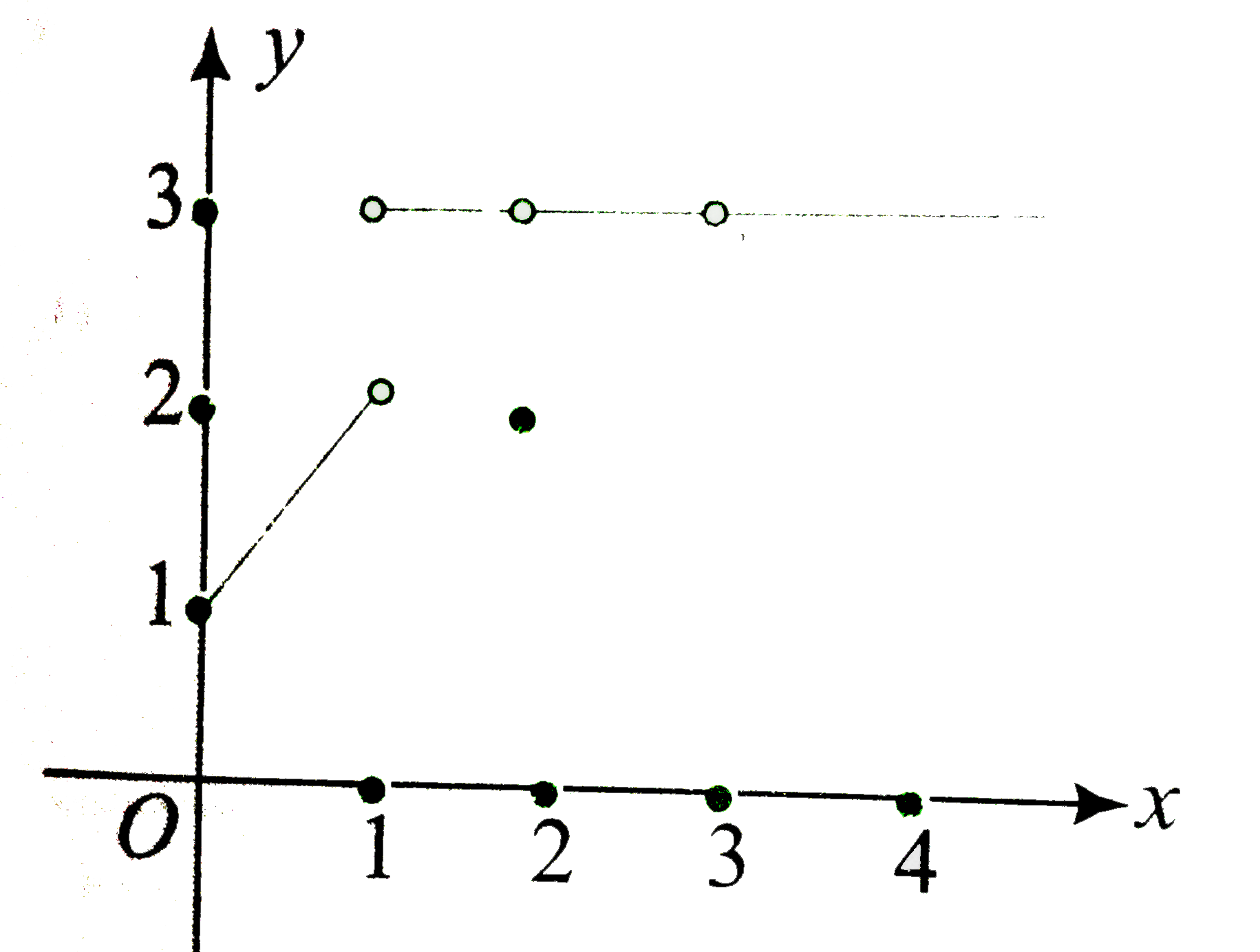Consider the following graph of the function y=f(x). Which of the following is//are correct?

(a)limx→1f(x) does not exist.
(b)limx→2f(x) does not exist.
(c)limx→3f(x)=3.
(d)limx→1.99f(x)exists.Solution in Tamil
The correct Answer is:(a), ( c ), (d)
a.limx→1+f(x)=3 and limx→1−f(x)=2. Thus,limx→1f(x) does not exist.
b.limx→2+f(x)=limx→2−f(x)=3. Thus,limx→2f(x) exist.
c.limx→3+f(x)=limx→3−f(x)=3. Thus,limx→3f(x) exist.
d.limx→1.99+f(x)=limx→1.99−f(x)=3. Thus,limx→1.99f(x) exist.
Topper's Solved these Questions
- LIMITSBOOK - CENGAGECHAPTER - LIMITSEXERCISE - Exercise 2.2
7 Videos
- LIMITSBOOK - CENGAGECHAPTER - LIMITSEXERCISE - Exercise 2.3
15 Videos
- LIMITSBOOK - CENGAGECHAPTER - LIMITSEXERCISE - Question Bank
17 Videos
- JEE 2019BOOK - CENGAGECHAPTER - JEE 2019EXERCISE - Chapter 10
9 Videos
- LINEAR COMBINATION OF VECTORS, DEPENDENT AND INDEPENDENT VECTORSBOOK - CENGAGECHAPTER - LINEAR COMBINATION OF VECTORS, DEPENDENT AND INDEPENDENT VECTORSEXERCISE - DPP 1.2
10 Videos
Similar Questions
If |f(x)|≤x2, then prove that limx→0f(x)x=0.
View SolutionEvaluate limx→1(2x−3)(√x−1)2x2+x−3.
View SolutionIf Limx→01−cosxeax−bx−1 exist and is equal to 1, then (a2+b2) equals
View SolutionIf y = y(x) is the solution of the differential equation, xdydx+2y=x2 satisfying y(1) = 1, then y(12) is equal to
View SolutionThe number of integral values of p for which (p+1)ˆi−3ˆj+pˆk,pˆi+(p+1)ˆj−3ˆk and −3ˆi+pˆj+(p+1)ˆk are linearly dependent vectors is q
View SolutionIf (lim)x→a[f(x)g(x)] exists, then both (lim)x→af(x)and(lim)x→ag(x) exist.
View SolutionWhich of the following statements about the function y=f(x) graphed here are true,an which are false ?( a )lim_(x rarr-1)f(x)=1(b)lim_(x rarr2)f(x) does not exist.
View Solutionlim_(x rarr c)f(x) does not exist when: (A) f(x)=[[x]]-[2x-1],c=3
View SolutionWhich of the following statement(s) is (are) INCORRECT ?. (A) If lim_(x->c) f(x) and lim_(x->c) g(x) both does not exist then lim_(x->c) f(g(x)) also does not exist.(B) If lim_(x->c) f(x) and lim_(x->c) g(x) both does not exist then lim_(x->c) f'(g(x)) also does not exist.(C) If lim_(x->c) f(x) exists and lim_(x->c) g(x) does not exist then lim_(x->c) g(f(x)) does not exist. (D) If lim_(x->c) f(x) and lim_(x->c) g(x) both exist then lim_(x->c) f(g(x)) and lim_(x->c) g(f(x)) also exist.
View SolutionConsider the following graph of the function y=f(x). Which of the following is//are correct?

(a)limx→1f(x) does not exist.
(b)limx→2f(x) does not exist.
(c)limx→3f(x)=3.
(d)limx→1.99f(x)exists.
View SolutionIf f(x)=sgn(x) and g(x)=x3,then prove that limx→0f(x).g(x) exists though limx→0f(x) does not exist.
View Solutionयदि f एक फलां इस प्रकार है कि f(−x)=−f(x) तथा limx→0f(x) का अस्तित्व है तब सिद्ध कीजिए कि limx→0f(x)=0
View SolutionStatement - I: if limx→0(sinxx+f(x)) does not exist, then limx→0f(x) does not exist.
Statement - II: limx→0sinxx=1
View SolutionSketch the graph of a function f that satisfies the given values:
f(-2) = 0 , f(2) = 0 , limx→−2f(x)=0
limx→2f(x) does not exist.
View SolutionConsider the function f(x)=sqrtx,xge0 . Does lim_(xto0)f(x) exist?
View Solutionयदि limx→a[f(x).g(x)] का अस्तित्व है, तब limx→af(x) और limx→ag(x) का अस्तित्व है |
View Solution
